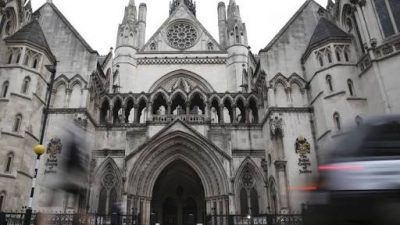UK Crime Agency wins test case for new anti-corruption powers

The woman has been fighting an Unexplained Wealth Order brought by the UK’s National Crime Agency, which challenged her to explain how she could afford two British properties worth £22m.
The High Court ruled in favour of the NCA on Wednesday and dismissed her attempt to challenge the order.
The case is the first time the NCA has used a UWO, a new tool for cracking down on the £90bn tide of “dirty money” flooding into London by forcing suspected corrupt officials to account for their wealth.
The agency can require owners of assets worth £50,000 or more to explain how they can afford them if their income appears to be too low. Donald Toon, director of the NCA’s economic crime unit, has said the agency is preparing to increase the use of UWOs, including against wealthy Russians.
In this case, Mrs A, who cannot be identified, had challenged an Unexplained Wealth Order made against her in relation to a British property bought by an offshore company in the British Virgin Islands that the NCA claims was purchased with stolen funds. The agency has also made a second UWO against another UK property that it believes she owns.
The court heard that Mrs A’s husband was chairman of a partially state-owned bank in a country outside Europe, and that he is in prison after being charged and convicted for large-scale fraud and embezzlement offences relating to the bank.
The court heard details of Mrs A’s lavish lifestyle, including that she enjoyed a private jet, fine wines and luxury homes — and spent £150,000 on jewellery at Harrods in a single day. At one point the family’s net worth was reported to be $72m, and a few years ago Mr A applied for a type of UK visa that is available to wealthy investors.
Mr Justice Supperstone, who dismissed Mrs A’s legal challenge, also noted that loyalty cards issued to Mrs A show that £16.3m was spent in Harrods between June 2006 and June 2016.
The failure of Mrs A’s appeal is being hailed as a success for the NCA. Transparency International, an anti-corruption pressure group that claims to have identified £4.4bn worth of UK property acquired by international buyers with suspicious wealth, welcomed the ruling. Duncan Hames, director of policy, said: “We now hope that the National Crime Agency will take confidence from this ruling and make greater use of this important new power. The UK has been long identified as a safe haven for corrupt money and despite successive governments recognising this, money launderers have continued to hide their ill-gotten gains here.”
However David Corker, partner at law firm Corker Binning, noted that asset recovery orders, a precursor to unexplained wealth orders, had been difficult to obtain because of the very high level of proof required, and said he expected the same to be true of UWOs. “High court judges require a high standard of evidence before they will grant these orders and deprive people of their property,” he said.
James Lewis QC, who represents Mrs A, had argued that the order should be discharged because her husband was not a “politically exposed person”, was not a state employee running a state owned bank and was simply a “fat cat” international wealthy banker. He told the court that the order was “disproportionate” and argued that Mrs A was at risk of unfair criminal proceedings in her home country, which cannot be named.
The NCA argued that the woman bought the properties using funds embezzled by her husband when he was employed at a state bank in their home country. Her failure to overturn the UWO means she will have to explain how she came to afford the properties or face having them seized.
Mr Justice Supperstone has ruled that the couple’s names could be revealed, but made an order delaying their identification until Mrs A’s lawyer has lodged an appeal. (Financial Times)

